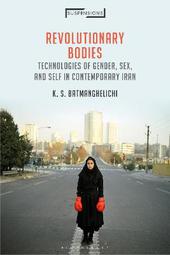
|
Revolutionary Bodies: Technologies of Gender, Sex, and Self in Contemporary Iran
Paperback / softback
Main Details
| Title |
Revolutionary Bodies: Technologies of Gender, Sex, and Self in Contemporary Iran
|
| Authors and Contributors |
By (author) K. S. Batmanghelichi
|
| Series | Suspensions: Contemporary Middle Eastern and Islamicate Thought |
|---|
| Physical Properties |
| Format:Paperback / softback | | Pages:256 | | Dimensions(mm): Height 234,Width 156 |
|
| Category/Genre | Social and political philosophy |
|---|
| ISBN/Barcode |
9781350195387
|
| Classifications | Dewey:305.30955 |
|---|
| Audience | | Tertiary Education (US: College) | |
|---|
| Illustrations |
22 bw illus
|
|
Publishing Details |
| Publisher |
Bloomsbury Publishing PLC
|
| Imprint |
Bloomsbury Academic
|
| Publication Date |
30 June 2022 |
| Publication Country |
United Kingdom
|
Description
Gender and sexuality in modern Iran is frequently examined through the prism of nationalist symbols and religious discourse from the late nineteenth and early twentieth centuries. In this book, Kristin Soraya Batmanghelichi takes a different approach, by interrogating how normative ideas of women's bodies in state, religious, and public health discourses have resulted in the female body being deemed as immodest and taboo. Through a diverse blend of sources -a popular cultural women's journal, a red-light district, cases studies of temporary marriages, iconic public statues, and an HIV-AIDS advocacy organization in Tehran - this work argues that conceptions of gender and sexuality have been mediated in public discourse and experienced and modified by women themselves over the past thirty years of the Islamic Republic. Expanding upon existing philosophical theory, technological research and scholarship on gender and sexuality in Iran, this book focuses much needed attention on under-studied, marginalized communities, such as widows living with HIV. This work interrogates how bodily technologies are constructed discursively and socially in Iran and the values and perspectives which are incorporated in them.
Author Biography
K. S. Batmanghelichi is Associate Professor for the Study of Modern Iran in the Department of Culture Studies and Oriental Languages at the University of Oslo, Norway.
ReviewsThis is a well-written book on a very important topic, which readers will find interesting and perhaps surprising. * CHOICE * Batmanghelichi provides a fascinating analysis of how the regulation of sexuality has evolved in Iran. The book takes us on an illuminating journey from reforming the visual arts, to regulating prostitution in red-light parks before the 1979 revolution and relying on temporary marriage after the revolution, to refashioning "modest" statues post-revolution, and finally to contradictory government approaches to dealing with HIV/AIDs. This is a must read if you want to understand sexuality before and after the Islamic revolution. * Melanie Heath, Associate Professor of Sociology, McMaster University, Canada * In this perceptive, well documented and illustrated study, Batmanghelichi depicts the scope, determination as well as failures of Iran's policy of moral cleansing targeting women's sexuality. Combining historical analysis and ethnographic research, this is a welcome addition to the literature on the resilience of women's sexuality to the power of moral engineering grounded in religion. * Marnia Lazreg, Professor of Sociology, Hunter College and Graduate Center, City University of New York, USA * Drawing on an innovating combination of archival, historical material; social policies including sexual health policies; art, women's magazines, and the rearrangement of public spaces in Iran over the last 100 years under two very different states, the author skillfully counters current understandings of the Islamic regime's treatment of women, their bodies, their dress and as a rupture from the Pahlavi era treatment of women. This book convincing argues that the policies of both regimes, and their perspectives on women, a part of a a continuum that views women and their public representation as central to national ideology as imagined by the state, regardless of each regime's particular political perspective. Readers are taken on an intriguing tour of a century of social and oral history and exploration of policy directives. This tour highlights the failures of these successive regimes to understand the diversity of Iranian women, to successfully manipulate women's bodies as a collective vehicle for state ideology, or to entrench their desired ideological hegemony. An unparalleled account of the role and the centrality of female citizens in the political imaginations of both the current Iranian regime and the Pahlavi monarchy it unseated, this is a work of original and interestingly sourced scholarship, and of thoughtful analysis. * Homa Hoodfar, Professor of Anthropology, Emerita, Concordia University, Canada *
|